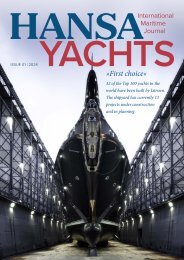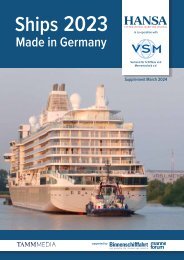HANSA 10-2017
Fährschifffahrt | Brexit | HIPER | Schifffahrt der Zukunft | Börsenbericht | US Ports & Hurricanes | Abwasser | Häfen Niedersachsen | HVAC | Job-Börse | Offshore-Marktkompass
Fährschifffahrt | Brexit | HIPER | Schifffahrt der Zukunft | Börsenbericht | US Ports & Hurricanes | Abwasser | Häfen Niedersachsen | HVAC | Job-Börse | Offshore-Marktkompass
Erfolgreiche ePaper selbst erstellen
Machen Sie aus Ihren PDF Publikationen ein blätterbares Flipbook mit unserer einzigartigen Google optimierten e-Paper Software.
Häfen | Ports<br />
Ports focus on resiliency after hurricanes<br />
In the United States, the double punch of two hurricanes- slow moving »Harvey« which<br />
hit the Gulf Coast of Texas at the end of August and the massive »Irma« which battered<br />
Florida during the second week of September, has brought the issue of resiliency to the<br />
forefront. By Barry Parker<br />
Every storm is different, and advanced<br />
forecasting of hurricane tracks is difficult.<br />
Hurricane Harvey’s damage, inflicted<br />
on the coastline from Corpus Christi<br />
up as far as Port Arthur/ Beaumont, resulted<br />
from unprecedented levels of rainfall<br />
and subsequent flooding. Hurricane<br />
Irma wreaked havoc with its high winds<br />
and storm surges in low lying areas; forecasters<br />
initially anticipated a landfall at<br />
Florida’s East Coast, where Miami, Port<br />
Everglades and Palm Beach are situated,<br />
only to watch the storm move over to the<br />
West Coast, affecting the Tampa Bay area.<br />
In advance of the respective hurricanes,<br />
ports in Texas and Florida were closed. The<br />
U.S. Coast Guard (USCG) is the agency<br />
that will make the determination of whether<br />
a seaport may remain operational, or<br />
not. When winds are anticipated to be at<br />
gale force (roughly equivalent to »Force<br />
7« for a sustained time period), within<br />
12 hours, the USCG will declare »Condition<br />
Zuluq at a particular port. After such a<br />
declaration, activity in the port must cease<br />
(for vessels that have not exited), and no<br />
vessel arrivals are allowed. Following the<br />
storms, the ports were then reopened after<br />
USCG inspection of facilities.<br />
In Texas, where Harvey hit, most of the<br />
refineries and terminals closed down in<br />
advance of the rain, with its resulting lack<br />
of electricity. Two weeks after the storm<br />
some of these facilities were finally resuming<br />
their operations.<br />
In Florida, where Irma hit two weeks<br />
later, planners had responded to misfortunes<br />
of the early 1990’s, when Hurricane<br />
Andrew stuck south of Miami in 1992.<br />
New construction standards had been<br />
augmented with requirements for hurricane<br />
resistance. Structural integrity is one<br />
aspect of resilience, but so is landside logistics.<br />
The recent storm exposed a series of<br />
logistics challenges for surface transportation<br />
in Florida (where there are no oil refineries,<br />
or pipelines from refining centers)<br />
for distribution of petroleum products –<br />
but the ports resumed operations quickly.<br />
Tampa and Port Everglades are both major<br />
hubs for gasoline and jet fuel, brought<br />
in by barges and tankers, from refineries<br />
in Texas or abroad in the case of tankers.<br />
Getting back in business<br />
Advance planning is vital. The Chief Executive<br />
Offcer of Port Everglades, Steve<br />
Cernak (the incoming Chairman of the<br />
Board of the American Association of<br />
Port Authorities), told <strong>HANSA</strong>: »Business<br />
continuity is a priority after, and sometimes<br />
during, an emergency. For that<br />
reason we focus on planning for a worstcase<br />
scenario. If the port cannot operate,<br />
it has a negative effect on all the businesses<br />
we serve and the community we live<br />
in.« Cernak, whose career includes work<br />
at the Port of New York and New Jersey,<br />
and at the Port of Galveston, Texas, is also<br />
Chairman of the Florida Ports Council.<br />
Proper execution is also crucial. Following<br />
its re-opening, two days after<br />
Irma had passed through Florida, Port<br />
Everglades was emphasizing the importance<br />
of restoring normal supply chains<br />
for fuels. The port informed that: »The petroleum<br />
companies based at Port Everglades<br />
are working around the clock to<br />
meet unusually high consumer demands<br />
resulting from Hurricane Irma. Three petroleum<br />
tank ships arrived Tuesday and<br />
are currently offoading 18 mill. gallons<br />
of gasoline, 3.5 mill. gallons of diesel and<br />
14.7 mill. gallons of jet fuel. Two more<br />
tank ships are scheduled to arrive tonight<br />
and tomorrow morning. The port representative<br />
added: »Ten of the 12 petroleum<br />
companies that operate at the Port have<br />
reopened,« and that: »Trucks began delivering<br />
storm reserves (4-day’s worth under<br />
normal circumstances) on Monday<br />
morning following Hurricane Irma.«<br />
In Texas, Hurricane Harvey exposed<br />
a major vulnerability, which is the sheer<br />
concentration of refineries and processing<br />
plants in a small area of the vast U.S.<br />
coastline. Antoine Halff, the Director for<br />
Global Oil Markets at the Center on Global<br />
Energy Policy at Columbia University,<br />
wrote that: »The flipside of US energy<br />
‘dominance,’ and more specifically of<br />
the phenomenal US ramp-up … unleashed by the shale<br />
miracle in the last few years, may thus<br />
paradoxically be, in some ways, heightened<br />
energy vulnerability.« One implication<br />
for U.S. policy presented by Halff<br />
might be increasing the 90-day-guideline<br />
for oil held in the U.S.’s Strategic Petroleum<br />
Reserve. Earlier in the year, President<br />
Donald Trump had suggested halving this<br />
reserve (holding nearly 700 million barrels<br />
of crude oil), for budgetary reasons.<br />
Benchmarking Resiliency<br />
Once skies have cleared after a hurricane,<br />
then what should happen at ports?<br />
In the context of maritime operations,<br />
key questions are: What types of preparations<br />
must ports make in advance<br />
of storms? How quickly can ports come<br />
78 <strong>HANSA</strong> International Maritime Journal – 154. Jahrgang – <strong>2017</strong> – Nr. <strong>10</strong>


















